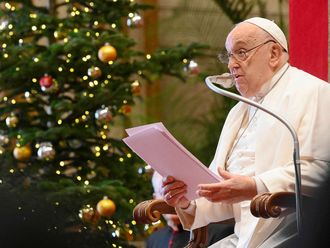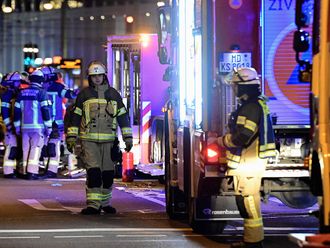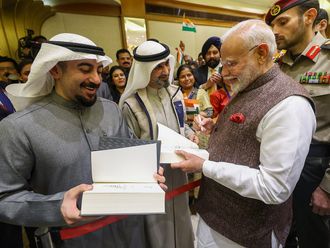
LONDON: Junior doctors in England will consider walking out for 72 hours in March as health unions remain at loggerheads with the UK government over pay.
The British Medical Association said it would call the three-day strike so long as its members vote to take action in a ballot that goes out on January 9.
Newly-trained doctors want a pay increase above the 2 per cent raise they are due this year.
Nurses and ambulance workers are already due to start a second round of strike action later this month, putting further pressure on a health service buckling from long waiting lists following the Covid pandemic. Hospital admissions for flu also soared to the highest level in a decade in the week before Christmas.
"All our calls to meet, and letters to the health secretary and his immediate predecessors, have been ignored," Vivek Trivedi and Robert Laurenson, co-chairs of the BMA junior doctors committee, said. "We are left with no choice but to act."
The government has refrained from discussing pay with unions, arguing it is the job of independent pay review bodies. On Thursday it said it was willing to discuss the process for deciding 2023 pay levels with unions.
Sunak hopeful
UK Prime Minister Rishi Sunak urged public-sector unions to hold talks with the government next week.
Each government department has written to union leaders representing striking workers in its area of responsibility, to invite them to meetings on Monday, he told reporters.
“We incredibly value the important work that our public-sector workers do, especially our nurses, and we want to have an honest, grown-up conversation about what’s affordable, what’s responsible for the country,” Sunak said.
“Those invitations have gone out and I’m hopeful that those meetings can happen on Monday so we can have a productive conversation and find a way through this.”
The invitation represents a volte-face of sorts, after the government had long insisted that it could not negotiate directly with nurses or railway staff, only via their direct employers.
Train drivers were on strike again Friday, forcing many Britons to work from home, and the union for junior doctors said it was holding a ballot to join nurses in their own unprecedented walkout.
The strikes mainly revolve around pay, which has failed to keep up with eye-watering inflation that breached 11 percent in October.
Among others striking this winter have been ambulance workers, border security personnel and postal delivery staff.
The government responded Thursday with a vow to enact new legislation requiring a minimum level of key public services during strike action, on pain of legal action against union leaders.
Sunak said he “fully” supported workers’ right to strike.
But the legislation would bring Britain into line with others such as France, Italy and Spain “so that even when strikes are going on you know that your health will be protected”, he said.
“I think that’s entirely reasonable and that’s what our new laws will do.” Meanwhile, the Royal College of Nursing wants the UK government to meet it “halfway” on pay, the union’s chief said, in another sign of softening positions ahead of more planned strikes later this month.
RCN General Secretary Pat Cullen told Times Radio’s Past Imperfect podcast that she wanted Health Secretary Steve Barclay to move much closer to the 19% increase sought by nurses. Sunak’s government has so far stuck with the advice of an independent pay review body, which has seen the average pay of nurses rise by around 4%.
“Absolutely, I believe they’re entitled to 19 per cent, but we also understand the economic climate that we’re working in,” Cullen said. “What I would say to Steve Barclay and to the prime minister is, ‘Get into a room and meet me halfway here. Do the decent thing for these nurses.’”
Media including Sky News and the Press Association subsequently reported that the union would be willing to accept an increase of about 10 per cent, without saying where they got the information.
Sunak has faced a wave of strikes this winter including by nurses, ambulance drivers and railway workers, with the RCN planning to strike again on Jan. 18 and 19. In a speech this week, Sunak also hinted at a more accommodating approach, saying he wanted “reasonable dialogue with the unions about what’s responsible and fair.”
Besides questions about how the UK would pay for such wage increases, the government and Bank of England are worried about a wage-price spiral taking hold and potentially driving inflation past the 41-year high of 11.1 per cent it reached in October.












